by Katherine Norris | Feb 7, 2020 | Academics, COBA Faculty, Current Students, Financial Management, Research, Uncategorized
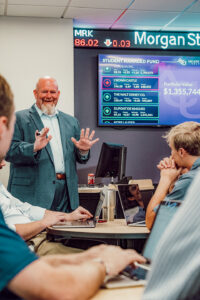
Jody Jones mentoring the STAR Fund Managers
Do you know about everything that goes on in COBA? We have so many awesome student programs, that chances are, you may have missed a few! STAR (Student Trading and Research) is a program where students learn to research an investment portfolio and trade assets based off their information. STAR began as an idea in 1999 and with an initial gift by a generous donor of $110,000 in June of 2000, ended its first full year of operation in 2001. Today, STAR manages a portion of ACU’s endowment and reports to the ACIMCO Board annually. STAR began as a student organization guided by Dr. Terry Pope and Dr. Jonathan Stewart. Now, students can earn course credit while they earn valuable real-world experience.
That kind of learning is something that Assistant Professor of Finance Dr. Jody Jones, who began teaching at ACU this past fall, is passionate about. Jones took over the STAR course after Dr. Pope retired last spring. Jones feels that one of the greatest learning opportunities that STAR affords is autonomy to the students in learning to make financial decisions. “All decisions are made by students. Although a faculty member helps guide decisions, the buying and selling of assets is dictated by student managers.”

Since inception, STAR has achieved an average return of nearly 50 basis points above its benchmark: S&P 500
Total Return Index. That’s reason enough to celebrate for any advising firm but this week STAR hit a huge milestone – the portfolio currently holds an outstanding $1.5 million.
Why is that such an important milestone? Dr. Jones explained, “The rising value of STAR allows students to better diversify and have more freedom in investment decisions. With the primary goal of the course being educational, students can buy and sell many assets and gain a broad perspective on the market. Also, this year will make it the first year that STAR has made distributions. The fund will return 4.5% of its value to the endowment to support scholarships, campus initiatives, and operations of the university.”
 While STAR mainly consists of finance majors, anyone who is interested can join and is encouraged to do so. If needed, students can even apply to receive course credit for being a fund manager.
While STAR mainly consists of finance majors, anyone who is interested can join and is encouraged to do so. If needed, students can even apply to receive course credit for being a fund manager.
Dr. Jody Jones loves his profession for more than the numbers. He is passionate about integrating faith into his work and teaching. “While many of the student managers intend to work in the investment and financial services fields after graduation, financial management is important for all organizations and households. Stewardship is also a spiritual discipline.”
by Maddy Crockett | Dec 31, 2019 | Academics, COBA Faculty, Faith Infusion, Research, Uncategorized
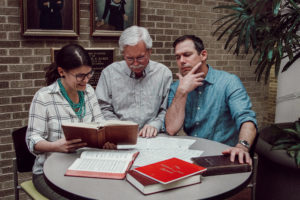
COBA has a rich heritage of faculty members who contribute to helping the college excel in many areas. This is shown in several ways – research being one of them. Faculty members Dr. Monty Lynn, Dr. Sarah Easter, and Dr. Ryan Jessup- all professors in the Management Sciences Department – recently finished a collaborative project titled: “Harmonizing Work and Faith”, which was completed with the help of music professor and Dean of the College of Arts and Sciences, Dr. Greg Straughn. “COBA faculty engage in creative research which keeps them sharp and contributes to knowledge,” Dr. Monty Lynn explained.
Dr. Lynn shared that the project’s inspiration stemmed from a common interest in seeing how Christians approach and practice business, both in the past and today. They came across a database of Christian hymns that peaked their curiosity earlier this summer, and the question was posed: What message do Christians communicate to each other in worship regarding work and do these messages change over time?
The three COBA faculty were very familiar with conducting research, but knew they needed professional insight into ‘hymnology’ – the study of hymns – in order to enrich and deepen their findings. They reached out to Dr. Straughn who graciously agreed to contribute to the project.
 The specifics of their research focused on hymns written between the years 1500 and 2000, with content addressing vocation. They applied qualitative research methods and identified 28 different messages Christians sing about regarding work. Some of the themes that emerged were being diligent in our work, work can be offered to God in worship, and work can be toilsome.
The specifics of their research focused on hymns written between the years 1500 and 2000, with content addressing vocation. They applied qualitative research methods and identified 28 different messages Christians sing about regarding work. Some of the themes that emerged were being diligent in our work, work can be offered to God in worship, and work can be toilsome.
Looking to see if these messages have shifted over time, the team found strong stability in the themes – with occasional shifts. These shifts seemed to align with different global events at the time which largely impacted the world.
For example, the theme of being rewarded for faithful work, both here and in Heaven, is strong. Yet, the theme declines after World War II, as the theme of solidarity with global workers rises. These findings, along with others, are shown in the data.
Lynn added, “For those who might say hymns are fading from many worship assemblies, we’re happy to report that contemporary music still connects with work – often indirectly, but sometimes in wonderful ways such as the hymns produced by The Porter’s Gate, such as their ‘Wood and Nails’ and ‘Your Labor is Not in Vain’.” The group presented their research at the Christian Business Faculty Association at John Brown University and their findings were highlighted on the Hymnary.org site (click here to read).
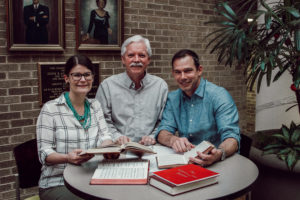
The group’s hope is that this study will be helpful in understanding the meaningfulness and spirituality of vocation. Speaking for all the contributors, Lynn closed with this: “This project was a distinct pleasure because of the complementary skills of the researchers and because we couldn’t help but sing our data!”
by M. C. Jennings | Aug 20, 2019 | Academics, COBA Faculty, Human Resource Management, Research, Uncategorized
It’s been quite a summer for Assistant Professor of Management, Dr. Dennis Marquardt. Marquardt was

Dr. Dennis Marquardt
voted as ACU’s 2019 Teacher of the Year in May, a prestigious honor as faculty member nominees are submitted by students, and he was named as the new Director for the Lytle Center for Faith and Leadership, succeeding founding Director, Dr. Rick Lytle. Dennis was also part of an award winning research team whose paper received recognition at the Academy of Management Conference in August in Boston, MA. The annual conference features over 10,000 management scholars from universities across the globe. We asked him to reflect on the awards, his new position, and what his plans are for the year ahead.
ACU’s Teacher of the Year award came as a surprise for Marquardt, who is deeply humbled, grateful and thankful for the honor. “When it was announced in the first graduation service, it took a little while for it to even register that they were talking about me. Since there are so many teaching giants at ACU that I deeply admire and respect, I really never thought I would get such an award.” When asked what drives his teaching, Marquardt explained, “It’s a sacred trust when a student comes into my classroom; something I try never to take for granted. Students are often told that the best way for me to show that I care for them is to maintain the highest of expectations for each of them. I want them to wrestle with tough questions, be exposed to new ideas, and be better equipped as a person than they were before coming to class. While learning is always a chief priority, the thing I care most deeply about as a professor is who my students are becoming as people. Dr. Martin Luther King, Jr. once wrote, ‘intelligence plus character-that is the goal of true education.’ I couldn’t agree more.”

Marquardt teaching at Leadership Summit
Marquardt’s passion for teaching students is evident in his classroom on the ACU campus and in his sessions at Leadership Summit, where he has served as a faculty member and mentor for the last four years. He’s also been involved with Lytle Center weekly chapels and a weekly morning men’s Bible Study that was born from Leadership Summit attendees asking Dennis and Tim Johnston to bring more of the lessons from the mountain to Abilene. Moving into the role of Director for the Lytle Center for Faith and Leadership is a natural fit for Marquardt. The Lytle Center is new to many people and Dennis looks forward to spreading the word about the mission of the Center. “Our slogan is: ‘Serving God in the Workplace, Serving the Workplace for God’. As people of faith in Jesus Christ, we believe our calling is to be leaders who influence others for the advancement of the kingdom of God (where hope, peace, and life abound). Because of this, we want the students, alumni, and faculty that we serve to be skilled and capable leaders. This means they can effectively promote a vision, drive change, resolve conflict, build teams, make decisions, and empower others. As highly capable leaders, our students and alumni become effective at the work they do and influential in the environments they operate in. We emphasize in the workplace since work is something we were all designed by God to do. The workplace is also a place of unique community, a unifier of sorts. Nearly everyone at some point in their life will engage in formal work. We work with and for people from all walks of life and backgrounds. While few go to church, nearly all go to work. If the world desires hope, peace, and life then the workplace is a great place to bring it”.
Dr. Marquardt is excited about the opportunity to continue and broaden the work of the Lytle Center. He

Dennis and his wife, Monique
has clear goals and a vision for where he would like to take the Center in the coming years. “The Lytle Center for Faith and Leadership exists to promote hope, peace, and life in the workplace. We do this by introducing individuals to the life and teachings of Jesus Christ and equipping them with cutting edge leadership competencies, so that they can be effective servant leaders in the workplace. That’s what coupling faith and leadership means to us.”
Dennis knows that this bold vision will come with some challenges, knowing that the most difficult challenge is in measuring the outcomes of the work done through the Center. “What we are really trying to do is promote spiritual leadership transformation and that requires a consistent commitment to character forming habits and behaviors over time. While we definitely want to inspire, inspiration holds limited power to change. Change requires building authentic relationships, having courageous conversations, and a lot of patience.”
Marquardt is very excited about adding more co-curricular options for students to learn important leadership competencies such as conflict resolution, time management, and ethics. He’s also looking forward to learning about and partnering with the “many great leaders across campus who are already doing great work in leadership development.”
Along with being a great teacher and mentor, Marquardt is proving that he is a strong researcher. A research project that he was invited to be a part of a several years ago by his doctoral advisor, Dr. Wendy Casper, was recently recognized at the Academy of Management Conference. He says, “This award is really a testament to the leadership and brilliance of my co-authors. I was fortunate enough to be invited onto this project by Dr. Casper. Our first author and tireless leader on the paper was Dr. Sabrina Volpone at the University of Colorado Boulder. Also, Dr. Derek Avery from Wake Forest University, a legend in management and diversity research, was a co-author. I learned so much from each of them and it was a great privilege to be a part of this meaningful work.”

The research team accepts the award at the conference – sans Marquardt who was not able to attend.
The team’s paper received recognition at the conference on August 14th in Boston, MA. The annual conference featured over 10,000 management scholars from universities across the globe. “Our author team is deeply honored that our paper was selected to receive the International HRM Scholarly Research Award, given annually to the most significant article published in international human resource management in the prior year (2018). This is awarded by the Human Resource Division of the Academy of Management. The conference theme this year is, Understanding the Inclusive Organization, which the findings of our paper fit well with.”
We asked Dr. Marquardt to summarize the paper for our readers. “We began our research with the question: Do individuals who grow up as a minority in their home country gain unique skills and abilities that might make them more effective as expatriate workers living in a host country? By analyzing the experiences of international students studying in the United States, we found that the more varied minority experiences people had in their home country positively related to more rapid acculturation as they studied in the U.S. This more rapid acculturation then related to higher levels of psychological well-being and lower intentions to leave the United States. We found that these relationships were influenced by cultural intelligence and the perceived diversity climate of the university. Overall, the paper demonstrates that minorities bring unique strengths to organizations, specifically those working in international assignments. The paper was published in the Journal of Applied Psychology and can be found by clicking here.
The topic was intriguing to Marquardt. “The richness of the minority experience has long been of interest to me. While there is a wealth of research on the challenges that minorities face, the unique strengths and abilities that minorities bring to the table because they have had to overcome those challenges are less well understood. It is my hope that our research helps shed some light in this area.”
Dennis hopes that students and those in the workplace can make applications from the team’s findings  now. “Our students are entering a workplace that is more globally minded than ever. David Livermore in his book, Leading with Cultural Intelligence, indicates that ‘Ninety percent of leading executives from sixty-eight countries identified cross-cultural leadership as the top management challenge for the next century.’ Our research demonstrates three significant resources worth considering when working and leading cross-culturally. The first is an understanding that having a minority experience provides an individual with vital resources for navigating novel cultural contexts. The second is the value of developing cultural intelligence, a personal capability related to understanding other cultures and behaving appropriately in different cultural environments. The third is the importance of fostering an organizational diversity climate that values unique backgrounds and provides support for people from non-dominant groups. I think students will largely learn about the importance of these resources as they see them modeled in the way that professors engage their classrooms.”
now. “Our students are entering a workplace that is more globally minded than ever. David Livermore in his book, Leading with Cultural Intelligence, indicates that ‘Ninety percent of leading executives from sixty-eight countries identified cross-cultural leadership as the top management challenge for the next century.’ Our research demonstrates three significant resources worth considering when working and leading cross-culturally. The first is an understanding that having a minority experience provides an individual with vital resources for navigating novel cultural contexts. The second is the value of developing cultural intelligence, a personal capability related to understanding other cultures and behaving appropriately in different cultural environments. The third is the importance of fostering an organizational diversity climate that values unique backgrounds and provides support for people from non-dominant groups. I think students will largely learn about the importance of these resources as they see them modeled in the way that professors engage their classrooms.”
Dr. Dennis Marquardt’s dedication inside and outside of the classroom is evidence of his own personal mission to serve and mentor students to help honor God and bless the world. Congratulations on a much-deserved summer of accolades, Dr. Marquardt!
by M. C. Jennings | May 23, 2018 | Academics, COBA Faculty, Current Students, Research, Uncategorized
Dr. Katie Wick has a Ph.D. in economics and teaches classes in microeconomics, macroeconomics, and game theory at ACU. Last semester, Dr. Wick worked on registered replications of two famous social science papers with student Rachael Shudde, whom Dr. Wick has mentored throughout her time at ACU. They were a part of a replication with 24 other universities to test the results of these papers to see if they still held. Dr. Wick and Rachael had just under 400 participants in their section and the meta-analysis of the whole replication had 8,000 participants. Dr. Wick was named Mentor of the Year at ACU’s Undergraduate Research Festival for her work with Rachael.
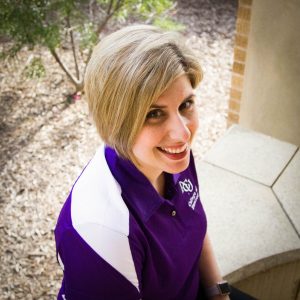
Dr. Katie Wick
The premise of the first paper was on hostility and how people view actions as hostile or not based on whether they were primed with angry words or regular words. The second paper, which was presented at ACU’s research festivals and others, focused on the effects of moral priming against cheating. Participants were presented with a test that asked them to solve twenty matrix equations and then write down the number of matrices that they solved. Only half of the matrices had solutions and participants were asked to solve each one in four minutes. If participants reported solving more than ten matrices and more than four minutes were used to solve problems, then the participant was cheating. Before taking the test, participants had to complete a priming task. The control prime was to write down ten books the participant read in high school and the moral prime, which was being evaluated to see if it had any effect on cheating, asked participants to write down the Ten Commandments. Dr. Wick was particularly interested in this replication at ACU because students are constantly morally primed. There are bible verses on the walls, chapels, and Christian professors who consistently integrate faith into their classrooms. Dr. Wick hypothesized that the moral priming task would not affect the participants at ACU as they are morally primed every day, which turned out to be true.
Beyond guidance through the project, Dr. Wick mentored Rachael through a major life transition. Dr. Wick has known Rachael since she was a freshman at ACU. Rachael approached Dr. Wick wanting to learn more about how to prepare for a Ph.D. in economics. Dr. Wick counseled her to study math, which became Rachael’s first major and has continued to walk with Rachael during her time at ACU. Throughout the project, Dr. Wick wanted to prepare Rachael for graduate school. Rachael had the task of taking all 400 experiments and inputting the test into a database for analysis. “I wanted to prepare her for the grunt work she will encounter,” said Dr. Wick. “The leap between undergraduate and graduate school is even bigger than the leap between high school and undergraduate school. It’s not glamorous and very hard.” Rachael wrote code to analyze the data, expecting the results to point to the original paper’s hypothesis that the moral prime decreased cheating. “I thought I had coded wrong,” said Rachael. “I was surprised to see that the ACU data contradicted the original results. That is my favorite part of data analysis: when you expect something to happen when you find results that are surprising.”
Rachael presented their findings on the cheating experiment at ACU’s Undergraduate Research Festival and at the Southwestern Psychological Association Conference. Dr. Wick was nominated by Rachael Shudde and won the award for Mentor of the Year at ACU’s Undergraduate Research Festival. “Dr. Wick is awesome and dedicated to research,” said Rachael. “She has a desire to answer questions and is good at designing and interpreting experiments. She is also great at giving feedback and guidance, which was invaluable throughout the research process.” Dr. Wick is grateful for the time she has been able to spend with Rachael and looks forward to seeing what she does during and after school.
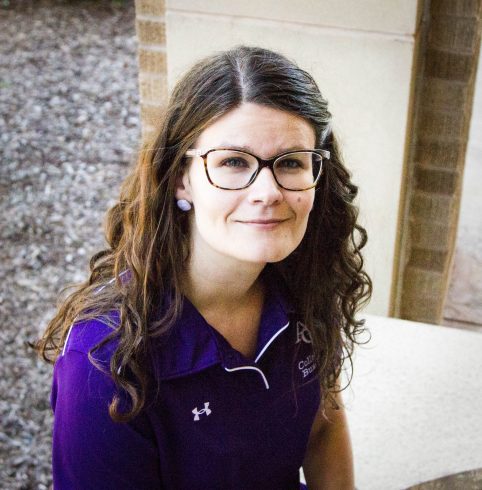
by Hanna Roberts | Feb 23, 2018 | Academics, COBA Faculty, Poverty and Development, Research, Social Entrepreneurship, Uncategorized
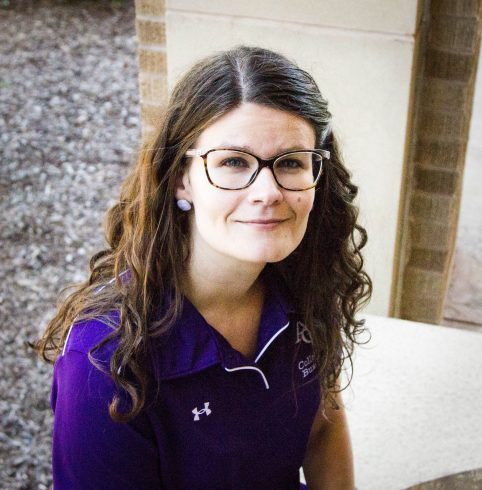
Dr. Sarah Easter is a professor in the College of Business Administration and teaches classes like Strategic Management, Business and Sustainability, and International Business.
Over the summer, Dr. Sarah Easter attended the Academy of Management (AOM) Annual Meeting: a professional association for over 10,000 management and organization scholars whose mission is to build a vibrant and supportive community of scholars by markedly expanding opportunities to connect and explore ideas. The theme of this year’s AOM Annual Meeting was ‘Improving Lives’ and specifically focused on how organizations can contribute to the betterment of society through elevating the health and well-being of those who live in it. In her dissertation research, Dr. Easter conducted a sixteen-month ethnographic study of a coalition to end homelessness in Western Canada. The coalition involved over forty different governmental, business and nonprofit players and she examined how they worked together toward common goals while considering many different perspectives. Dr. Easter presented a paper over one of the key findings of this research and received the Best Paper Award based on a Dissertation from the Managerial and Organizational Cognition Division of the Academy of Management.
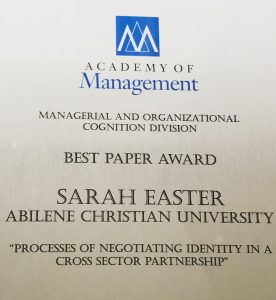
Dr. Sarah Easter was presented with the Best Paper Award for processes of negotiating identity in a cross-sector partnership.
Dr. Easter’s dissertation research centered on the challenge of the coalition: developing a cohesive and unified identity (i.e., its focal purpose and goals) in the face of a variety of different perspectives. Those involved in the coalition had many different viewpoints on what the central issue they were working to address entailed, which was homelessness. Even though all participants talked about the notion that the overall vision to end homelessness was well understood by all involved, the result was that the partnership was often pulled in multiple directions simultaneously. The findings speak to the importance of such collaborative partnerships as being very explicit in terms of the vision they are working to achieve. This involves having ongoing discussions and check-in points to ensure that all players are able to clearly articulate the direction of the partnership, including underlying meanings of terms utilized, particularly as participants are continually cycling in and out. Dr. Easter was fascinated in learning how a diverse body of organizations and individuals from public, private and nonprofit sectors come together to address a significant societal issue over time and was able to develop a deep understanding as to how the coalition evolved over time in the presence of many and very different ways of working.
Dr. Easter took special notice of the pull between both opportunities and challenges that organizations face in carrying out their work while conducting her research. This is something she emphasizes while teaching classes like Strategic Management, Business and Sustainability, and International Business. “I believe strongly that it is important to consider both dimensions in order to develop a more holistic perspective of a given organization’s current situation,” Dr. Easter emphasized. “I bring up this example in my courses: an organization that has incredible potential to make an impact in addressing homelessness in the local region (opportunity). At the same time, though, there are incredible challenges associated with this complex structure.” Dr. Easter continues a passion for studying how people work across cultural and socioeconomic structures especially through addressing major societal challenges and looks for ways to connect with people and organizations as well as share this passion with her students in the classroom.
by M. C. Jennings | Jan 11, 2017 | Academics, COBA Faculty, Research
by guest bloggers Dr. Ryan Jessup and Dr. Don Pope
Well, the dust has settled on another bowl season and it is time to evaluate the success (or, lack thereof) of the JP ranking system.
You might remember from last season that we concluded that a blind squirrel would be about as equally effective as our ranking system. Well, this season that blind squirrel (technically, he is blindfolded) made us look silly.

Figure 1. How well did we do? If last season we did about as well as a blind squirrel flipping a coin then this season that blind squirrel took our money.
You see, out of 42 bowl games we correctly predicted the winner approximately 54% of the time, and, in the 6 games in which we predicted a different winner compared to the college football playoff (CFP) selection committee, we were correct half the time and they were correct the other half. However, we correctly predicted against Vegas 48% of the time. So, this year the squirrel beat us.
What went wrong? This is always a useful question. One issue is that the Big 10 was a Big Letdown, finishing a miserable 3-7 in their bowl games, performing overwhelmingly worse than expected. Likewise, Clemson outperformed expectations as they upset both Ohio State and Alabama, two teams that both we – and Vegas – thought would win. Why these things occurred is rather difficult to determine: did the Big 10 perform well against non-conference games – which usually take place early in the season – and then fall off later on? It is hard to know for sure.
Regarding Vegas, last bowl season the Vegas favorite covered the line approximately 60% of the time. Interestingly, they only covered the line a mere 35% of the time this season meaning even they had a hard time predicting the outcomes. But in the end, you can’t fight city hall, and, really, you probably shouldn’t mess with Vegas either as the house is truly playing with a stacked deck.
One thing that does give us hope is that, even though hundreds of millions of dollars are on the line for the college football playoff and a prestigious 13 member selection committee generates the rankings, our simple ranking system fares about as well, getting the same number of correct predictions. So, maybe next year the CFP should drop their committee-based ranking system and just hire that squirrel.


 While STAR mainly consists of finance majors, anyone who is interested can join and is encouraged to do so. If needed, students can even apply to receive course credit for being a fund manager.
While STAR mainly consists of finance majors, anyone who is interested can join and is encouraged to do so. If needed, students can even apply to receive course credit for being a fund manager.
 The specifics of their research focused on hymns written between the years 1500 and 2000, with content addressing vocation. They applied qualitative research methods and identified 28 different messages Christians sing about regarding work. Some of the themes that emerged were being diligent in our work, work can be offered to God in worship, and work can be toilsome.
The specifics of their research focused on hymns written between the years 1500 and 2000, with content addressing vocation. They applied qualitative research methods and identified 28 different messages Christians sing about regarding work. Some of the themes that emerged were being diligent in our work, work can be offered to God in worship, and work can be toilsome.




 now. “Our students are entering a workplace that is more globally minded than ever. David Livermore in his book, Leading with Cultural Intelligence, indicates that ‘Ninety percent of leading executives from sixty-eight countries identified cross-cultural leadership as the top management challenge for the next century.’ Our research demonstrates three significant resources worth considering when working and leading cross-culturally. The first is an understanding that having a minority experience provides an individual with vital resources for navigating novel cultural contexts. The second is the value of developing cultural intelligence, a personal capability related to understanding other cultures and behaving appropriately in different cultural environments. The third is the importance of fostering an organizational diversity climate that values unique backgrounds and provides support for people from non-dominant groups. I think students will largely learn about the importance of these resources as they see them modeled in the way that professors engage their classrooms.”
now. “Our students are entering a workplace that is more globally minded than ever. David Livermore in his book, Leading with Cultural Intelligence, indicates that ‘Ninety percent of leading executives from sixty-eight countries identified cross-cultural leadership as the top management challenge for the next century.’ Our research demonstrates three significant resources worth considering when working and leading cross-culturally. The first is an understanding that having a minority experience provides an individual with vital resources for navigating novel cultural contexts. The second is the value of developing cultural intelligence, a personal capability related to understanding other cultures and behaving appropriately in different cultural environments. The third is the importance of fostering an organizational diversity climate that values unique backgrounds and provides support for people from non-dominant groups. I think students will largely learn about the importance of these resources as they see them modeled in the way that professors engage their classrooms.”



